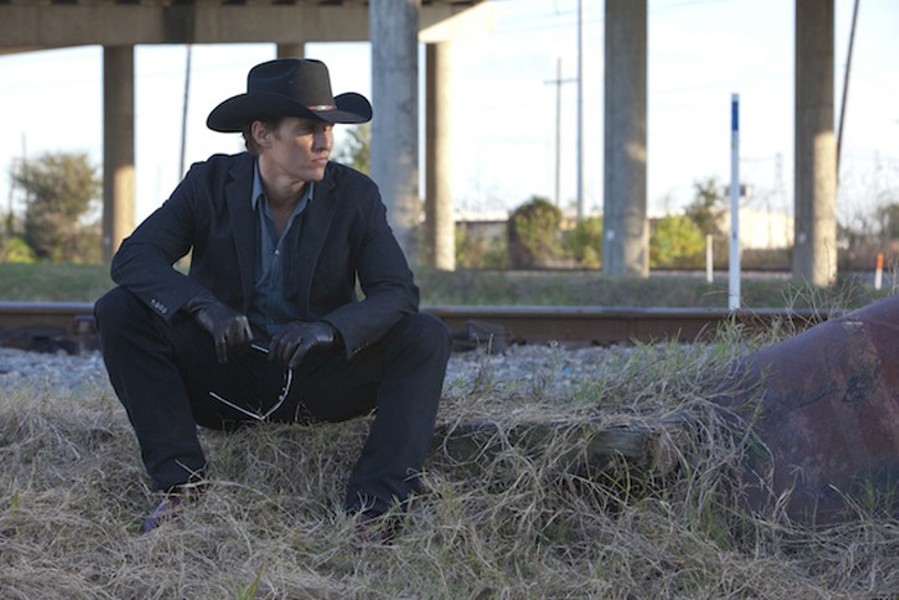Though the dreaded NC-17 rating usually frightens producers and directors, it apparently didn't deter William Friedkin, whose work includes not only such classics as "The Exorcist" and "The French Connection," but also the daring and highly unpopular "Cruising." His new film, "Killer Joe," most likely earned its rating not for the usual causes, i.e., excessive and graphic sexual content — though it also features a fair share of that particular element — but for its terrific violence (and these ratings people call themselves Americans!).
Initially the movie, based on a play by Tracy Letts, looks like a parody of those horror flicks of the sort that employ a rural locale and perverted rustics. It opens in one of those ferocious Southwestern thunderstorms, where a young guy races through the rain to, yes, a trailer park, where he pounds frantically on the door of one of the homes, until a sexy woman, naked from the waist down, lets him in, whereupon they scream about her nudity. The young man is Chris Smith (Emile Hirsch) and the woman is his stepmother, Sharla (Gina Gershon); their quarrel awakens his father, Ansel (Thomas Haden Church), beginning another sort of parody, a grotesque Texas version of a family situation comedy.
Chris's desperation stems from a $6,000 debt he owes a drug dealer, which he plans to repay by joining with Ansel in murdering his mother, Ansel's ex-wife whom everybody hates, for her $50,000 life insurance policy. After some persuasion, Ansel, who is even dumber than Chris, and the greedy Sharla agree to go along with the scheme. To do the job, Chris knows of a Dallas detective named Joe Cooper (Matthew McConaughey), the Killer Joe of the title, who does a sideline in contract hits.
Once McConaughey enters the action the whole movie belongs to Killer Joe, one of the most unsettling bad guys in recent cinema. Dressed in black, wearing a Stetson, shod in ostrich-leather cowboy boots — it is Texas, after all — he moves slowly and carefully, speaking with a soft, precise deliberation. He exudes an intimidating air of absolutely calm and confident menace that contrasts wonderfully with the dim confusion of his would-be employers.
When the Smiths explain that they cannot come up with the advance he requires, he asks for Ansel's nubile, slow-witted daughter Dotty as a "retainer." Despite some minimal qualms, Ansel agrees to pimp his daughter in to pay for the killing of her mother. The seduction scene that follows this decision reveals the strangely perverse nature of Killer Joe, a mixture of sick carnality with a kind of weirdly romantic eroticism.
Unsurprisingly, the ostensibly simple, straightforward assignment goes horribly wrong in complicated ways for a variety of reasons, most of them deriving from some greedy, stupid people outsmarting themselves. The working out of the scheme also involves a good deal of pure brutality, with a couple of terrible beatings and a particularly bizarre and bloody climactic sequence that looks a lot like some low-rent version of a Shakespeare play. The stylized conflicts of the average blockbuster, with people throwing each other all over the scenery, thanks to the magic of special effects, in no way resemble the very real, very bloody business of one character viciously beating another into insensibility.
Aside from McConaughey's performance, the rest of the cast generally behaves with conviction, often displaying an exaggeration that intensifies his understatement. With his large, clumsy physique and his slow, heavy voice, Thomas Haden Church portrays stupidity perhaps better than any current Hollywood actor, though why a sexpot like Gina Gershon's Sharla would marry him remains a mystery. Appearing in more scenes than any of the other actors and actually exhibiting an ounce or two of nobility, Emile Hirsch's increasingly hysterical Chris soon, however, grows tiresome and repetitive.
Except for the numerous scenes set inside Ansel's trailer, "Killer Joe" seldom displays the stagey, enclosed look of so many filmed plays. It employs a number of other settings, all of them in thematic tune with the trailer park and its grubby, sordid, sometimes criminal context — closed-up shops, strip joints, biker bars, abandoned factories. This is not the mythic movie Texas of the open range and the limitless horizon, but, like it or not, the Texas of today.
